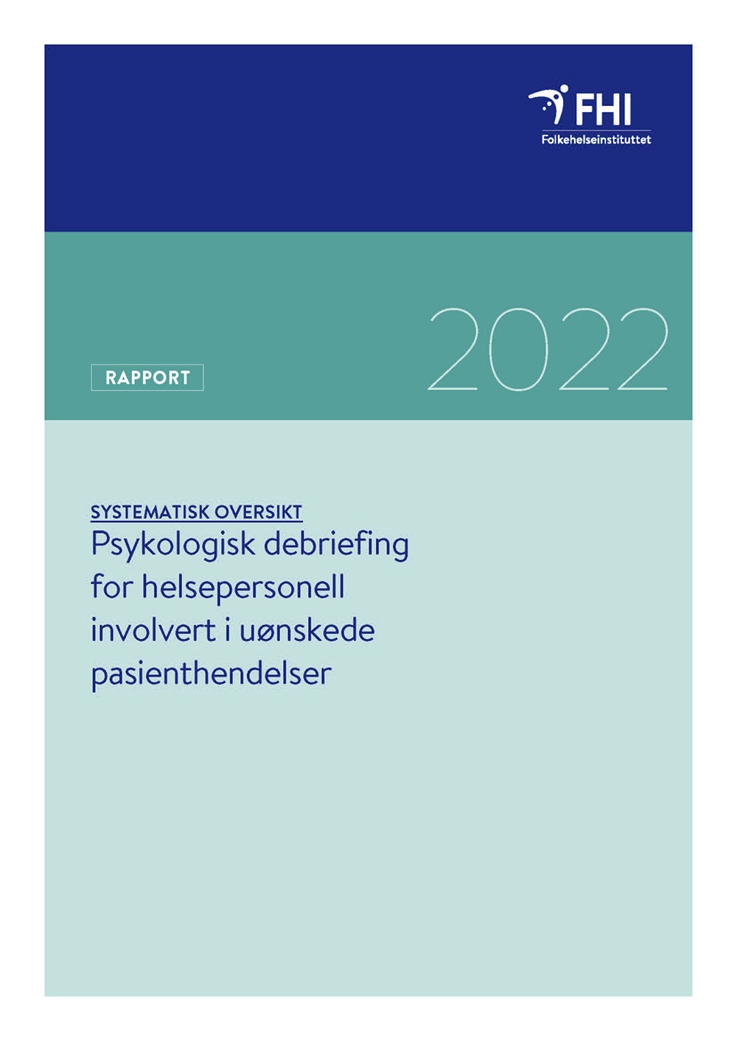Psychological debriefing for healthcare providers involved in adverse events: a systematic review
Systematic review
|Published
This systematic review aims to determine the effects of psychological debriefing for healthcare professionals who have been involved in adverse events.
Key message
Healthcare professionals involved in adverse events in which the patient is the first victim are often referred to as second victims and they may experience strong emotional reactions after the adverse event. Different versions of psychological debriefing have been proposed to support healthcare professionals and to prevent adverse emotional consequences after adverse events. There has however been disagreement in the literature on whether psychological debriefing is effective. It is therefore a need for summarized research on this topic.
This systematic review aims to determine the effects of psychological debriefing for healthcare professionals who have been involved in adverse events. Our inclusion criteria encompassed randomized and non-randomized studies with control groups evaluating the effects of psychological debriefing for healthcare professionals, defined as second victims, after an adverse event.
We searched four databases and identified 8224 references. We screened titles and abstracts of all records identified by the search and read 58 relevant studies. We contacted both clinical experts and the commissioner to identify relevant literature. We identified no studies that met all the inclusion criteria.
Our most important finding is the lack of research on the effects of psychological debriefing for healthcare professionals who have been involved in adverse events. We can therefore not draw any conclusion about the effect of psychological debriefing for this population group.
Summary
Introduction
Healthcare professionals involved in adverse events need support and follow-up to prevent serious consequences. Different versions of psychological debriefing have been proposed to support healthcare professionals and to prevent adverse emotional consequences after adverse events. There has however been disagreement in the literature on whether psychological debriefing is effective. It is therefore a need for summarized research on this topic. In this systematic review, we refer to psychological debriefing as a structured form of psychological support given within a short time after an adverse event, aiming to address emotional consequences and prevent stress reactions, such as posttraumatic stress disorder (PTSD) or depression.
Objective
This systematic review aims to determine the effects of psychological debriefing for healthcare professionals who have been involved in adverse events.
Method
We carried out a systematic review in accordance with the methodological handbook of the Division for Health Services at the Norwegian Institute of Public Health. We wrote a project plan, which was peer-reviewed by clinical experts, presented to the commissioner, and got published on February 1, 2022. A librarian conducted a comprehensive literature search in December 2021 in cooperation with the project team. Another librarian peer-reviewed the searches. We searched four international databases. We also contacted both clinical experts and the commissioner to identify relevant literature. The team members screened independently titles and abstracts of all records identified by the search and read the full text of relevant studies against the following inclusion criteria:
Population | Healthcare professionals involved in adverse events, where the patient is the first victim. |
Intervention | Psychological debriefing. |
Comparison | Other active interventions (e.g., psychological first aid or after-action review) and/or no intervention after the adverse event. |
Outcomes | Primary outcomes Post-traumatic stress disorder (PTSD), anxiety, depression Secondary outcomes Sick leave, dropout from treatment, defensive practice |
Study design | Randomized and non-randomized controlled studies, and prospective cohort studies with control groups. |
Publication year | 2000 - 2021 |
Country/context | High-income countries, as defined by the World Bank. |
Language | All who are mastered by FHI's project team or other FHI employees. |
We used the electronic tool EPPI-Reviewer throughout the selection process. To streamline the screening of titles and abstracts, we used the machine learning function "priority screening" in this software.
Results
We retrieved 8224 unique references. Of these, we excluded 8166 references at title and abstract level and assessed 58 references in full text. None of the studies read in full text met the inclusion criteria.
Discussion
There is a lack of research on the effect of psychological debriefing for healthcare professionals who have been involved in adverse events. We conducted a systematic review according to predefined methods and performed thorough searches in several databases. We chose to search broadly to capture all the potentially relevant studies.
In light of the broad definition of psychological debriefing in the literature, we chose an equivalent broad definition in our inclusion criteria, accepted all comparisons, and considered both randomized and non-randomized studies for inclusion. Furthermore, we contacted both clinical experts and the commissioner to identify additional literature that could have been relevant to this report. Nevertheless, we did not identify any studies that met the inclusion criteria. Hence, although it is still possible that we have missed relevant literature, we consider it unlikely.
Some of the excluded studies had research aims like ours, studying psychological debriefing as an intervention and health-related outcomes, but these studies were excluded due to lack of control group, use of retrospective study design, or uncertainty about the number of participants who were either healthcare professionals or second victims in adverse events. Significant efforts are therefore warranted to better answer the research question addressed in this report.
Conclusion
We found no relevant studies and we can therefore not draw any conclusion about the effect of psychological debriefing for healthcare professionals involved in adverse events.


